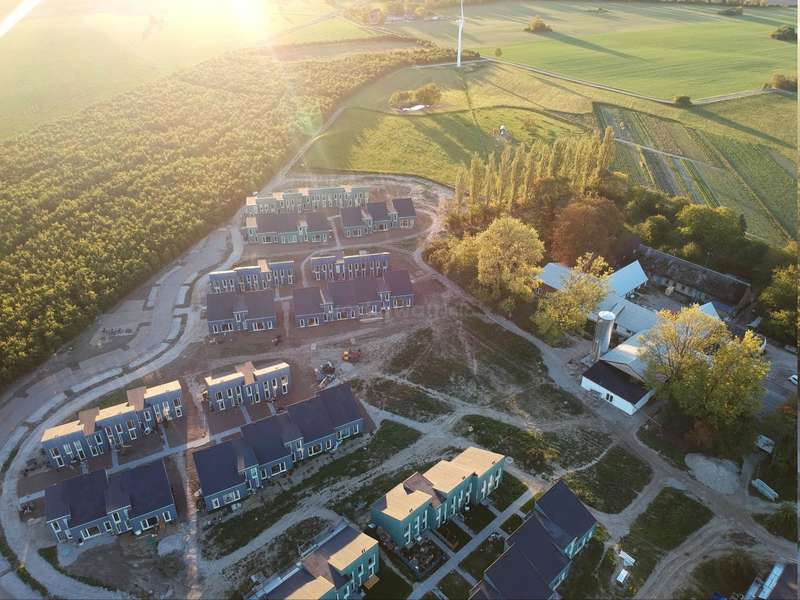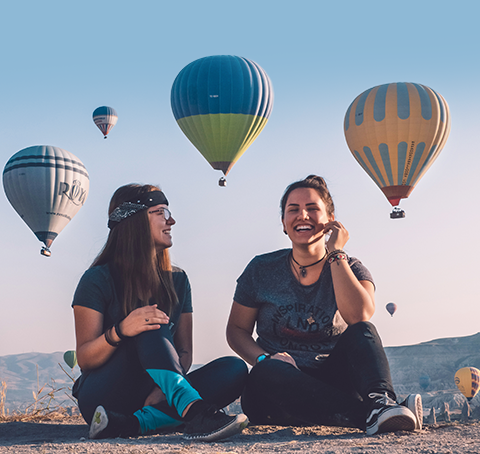Profile information

Host rating
100 %

Last replied
23 Apr 2024

Reply rate
96.7 %
Usually responds within 10 days

Feedback
17

Email verified
Badges (1)

Details

Description
The ecovillage, which is about one hour from Copenhagen, was established in 2018 with the aim of developing a practical example of a more sustainable and communal way of living. We engage in local food production, decentralized energy production, and a low-impact culture, where we take care of each other and the environment.
The village consists of 90 low energy houses and 30 hectares of land. We have common buildings, a windmill, a heating system based on heatpumps, and a willow sewage cleaning plant. The population is around 90 children and 150 adults of different ages and backgrounds. We have dinner together five days a week in the main hall.
It has 7 hectares of certified organic agriculture where we produce a variety of vegetables and fruits – primarily for our own consumption, with some products sold to restaurants. We have a vegetable field, a market garden, greenhouses, permaculture gardens, and a fruit and berry orchard. We also have chickens, ducks, bees, and a few goats and sheep.
We aim to cultivate all of our land using methods of regenerative agriculture and permaculture because increasing biodiversity and taking care of the soil is very important to us. We have a number of composting projects, some started recently, including vermicomposting, hot-composting and bioreactor composting. We make compost extracts to add beneficial microbes and boost the life in the soil.
Next to the farm is a small oak forest that we use for materials, and we manage this and our other common areas with respect for biodiversity.
The daily work is done voluntarily by the villagers and by our full-time farmer Anders, and of course by our volunteers, whose help is very important to us.
We generally encourage you to stay for a couple of months or longer. The longer you stay, the better you can get to know our village and how it functions, and you can learn much more about regenerative agriculture.
Types of help and learning opportunities
Help with Eco Projects
Gardening
DIY and building projects
Farmstay help
General Maintenance

UN sustainability goals this host is trying to achieve

Cultural exchange and learning opportunities
Every week there is some activity in here This could be yoga, sauna sessions, mending classes, small festivals or dancing events, or day trips to see the surrounding area, which are all free for volunteers.
There are many possibilities for meeting people when we are working and eating together and at informal or organized social events. As a volunteer, you stay in our common buildings, which is the area where people meet.
Volunteers are mostly young people who come from all over the world and have many different backgrounds. We welcome people of all ages. There are many interesting conversations taking place during the day and volunteers here often become friends during their stay.
We consider ourselves a “learning organization”; we don’t have all the answers, but we’re trying to find them as we go along – and we hope that our volunteers will take part in this.
We prioritize teaching volunteers about regenerative agriculture and sustainable living so that you can take what you have learned with you and help spread those ideas in the world.
Help
We primarily need help in the vegetable production. It is physical work and takes place outdoors.
The core tasks are planting, weeding, watering, and harvesting.
The tasks vary with the seasons:
In spring, we get the soil ready and put thousands of plants in the soil, and we take care of the beds by weeding and watering.
In summer, we start harvesting (and eating!) the crops, and everything grows like crazy so we have lots of weeding and watering. There are still some plantings done.
In autumn, it’s all about getting the big harvests in and processing them for storage so that we can feed the village during winter.
Other tasks include:
Sowing seeds and tending to seedlings
Preparing beds for plantings
Composting and recycling of nutrients
The longer you stay with us, the more varied the tasks can become. Long-term volunteers will also receive more training and be able to handle more advanced tasks. Overall, we think that long-term stays are more enjoyable for everyone.
Workdays are usually Sunday to Thursday.
Languages
Languages spoken
Danish: Fluent
English: FluentThis host offers a language exchange
This host has indicated that they are interested in sharing their own language or learning a new language.
You can contact them directly for more information.
Accommodation
Our hostess Helle will look after you and make sure you have a good stay with us. She is the one who welcomes you when you arrive.
You will stay at the first floor of our common building, in rooms for one or two people. If there are many people staying with us at once, you may be asked to share a room with someone else. Volunteers share a kitchen and also have access to laundry facilities.
Please note that we only use organic/biodegradable soap/shampoo at our place. So please don't bring other types with you :)
On weekdays, there is a communal lunch and dinner together in the main dining hall. There is always a vegetarian and vegan option available. In the weekends and during the summer holidays (from late June to early August), volunteers cook for themselves.
You receive a cash allowance during your stay, which is higher on days where no food is served.
What else ...
Our place is in the countryside but still only about an hour away from Copenhagen. It is easy to make a day trip (or longer) there to enjoy what the city has to offer.
We are also close to the sea and Stevns Klint, a chalk cliff which is a Unesco World Heritage Site renowned for the its fossils.
A little more information

Internet access

Limited internet access

We have pets

We are smokers

Can host families

Can host digital nomads
This host has indicated that they love having digital nomads stay.

Space for parking camper vans
This host can provide space for campervans.

How many Workawayers can stay?
More than two

Hours expected
Maximum 5 hours a day, 5 days a week
Feedback (16)
The best part of the experience was definitely the community. Everyone is so extremely friendly and nice, and everyone will go out of their way to make you feel welcome and at… read more
The community is simply lovely. I didn't meet a single person who didn't go out of their way to make me and other volunteers feel welcome and involved. I met some wonderful people that I hope to… read more
Feedback
These are extra optional ratings when members leave feedback. The average rating left for each option is displayed.
Accuracy of profile:
(4.4)
Cultural exchange:
(4.9)
Communication:
(4.8)
The best part of the experience was definitely the community. Everyone is so extremely friendly and nice, and everyone will go out of their way to make you feel welcome and at… read more
The community is simply lovely. I didn't meet a single person who didn't go out of their way to make me and other volunteers feel welcome and involved. I met some wonderful people that I hope to… read more
The work is mainly done in… read more
My hosts and all the residents I met were extremely welcoming, friendly, and considerate of me. If I ever had any concerns, everybody was willing to listen and respond helpfully. That being said, I had almost no concerns at all! The housing was comfortable, there was plenty of fresh produce to eat (and a generous… read more
The village was very quiet while I was there because many people were on holiday. I didn't suffer it too much also thanks to the presence of many… read more
I have learned a lot about plants, cultivation techniques and adaptation of each species thanks to Morten, a person with a lot of wisdom and care for the place. I have also received a lot of love from each of the families who live there. It was definitely the perfect combination of… read more
He showed a vivid interest in permaculture and the relationship between humans and nature. He has a very forthcoming nature, and actively sought out experiences and tasks, eager to learn, and with his good mood he reached out to many people in our community
There are a lot's of people and expectations so if you like to work on an "Demeter-field"than you should realy go there...
There is 2 différents part to talk about:
1) The community: if you like to live between a lot of people and learn things with them, that's the perfect place: you'll be always in contact with someone different, make special connections with some of them and most… read more
The people in this place creates a very welcoming and open-minded atmosphere. This is a thing for which stands for: thinking about future perspectives and still being an open-minded, welcoming place, with diverse people. I really liked to see… read more
The work is nice and… read more
































